I wrote this article in Japanese and translated it into English using ChatGPT. I also used ChatGPT to create the English article title. I did my best to correct any translation mistakes, but please let me know if you find any errors. By the way, I did not use ChatGPT when writing the Japanese article. The entire article was written from scratch by me, Saikawa Goto.
Introduction
Movies and books covered in this article

Three takeaways from this article
- The octopus has acquired a brain so advanced that it is not Invertebrata by a completely different path than humans.
- Why did they evolve the energy-intensive organ of a brain?
- We humans may never be able to fully comprehend their consciousness.
Self-introduction article


Published Kindle books(Free on Kindle Unlimited)
“The genius Einstein: An easy-to-understand book about interesting science advances that is not too simple based on his life and discoveries: Theory of Relativity, Cosmology and Quantum Theory”
“Why is “lack of imagination” called “communication skills”?: Japanese-specific”negative” communication”
The quotes in the article were translated using ChatGPT from Japanese books, and are not direct quotes from the foreign language original books, even if they exist.
According to the Author, Octopuses are the Creatures that are Most Similar to Extraterrestrial Biological Entities for Us Humans
I Didn’t Know the Fact that Cephalopoda have Advanced Brains

The most surprising thing I learned from reading this book is that Cephalopods, such as octopuses, have highly developed brains similar to humans. I had no idea about this before.
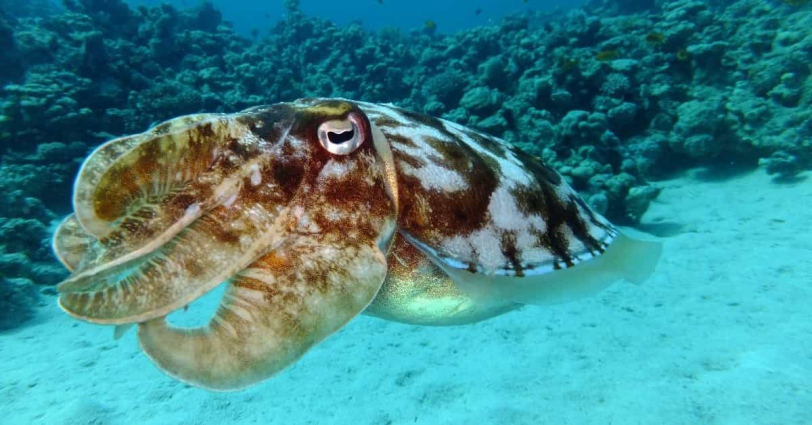
Now, the expression “highly developed brain” can be misleading, so let’s first understand this accurately.
Dolphins and crows are known to be “intelligent.” However, while the brain of a dolphin is larger than that of a human, the brain of a crow is smaller than that of a human. This means that intelligence cannot be judged solely by the size of the brain.

So, let’s compare the brain size to body weight using the “encephalization quotient.”
Human: 7.4
Dolphin: 5.3
Crow: 1.25
It turns out that crows have a relatively small brain compared to their body size.
Apparently, brain size does not necessarily determine intelligence. So, how is it determined whether a brain is highly advanced or not?

It is “the number of neurons.” And it is said that Cephalopoda, including octopus and squid, have a very high number of neurons. Let us first understand that the octopus has many neurons and has a very advanced brain.
I’ve known about the book “Other Minds: The Octopus, the Sea, and the Deep Origins of Consciousness” for a while, but I thought the title was a philosophical metaphor. I believed it was a book about imagining what would happen if octopuses had advanced intelligence even though they didn’t really have it.
So, I was surprised to learn that octopuses actually do have advanced brains and are intelligent creatures.

Cephalopoda is a Unique Invertebrata
And there’s something even more amazing about them – they’re one-of-a-kind.
Cephalopoda is like a solitary island floating in the sea of Invertebrata, and no other invertebrates with such complex internal structures exist.
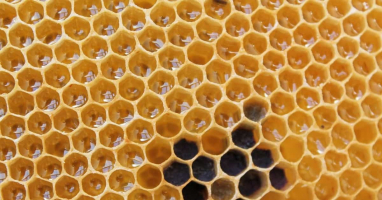
Basically, when we talk about “animals that evolved a brain,” we think of Vertebrates such as mammals, birds, reptiles, and fish – animals that we can imagine having a brain.
However, even though Cephalopoda have advanced brains, they are not Vertebrates; they are Invertebrates. This means that Cephalopoda are the only Invertebrates that have evolved an “advanced brain.”

I’ll start by quoting an impressive passage, and later on I’ll touch on this point again.

Encountering Cephalopoda may be the closest experience we have to encountering extraterrestrial intelligent life.
“Vertebrates with brains” can be thought of as “comrades who have undergone similar evolution”. However, Cephalopoda, the only invertebrates that have evolved brains, have evolved their brains in a completely different way than us. Therefore, the author writes that for humans, encountering an octopus is similar to meeting an alien.

The translator of this book writes the following about this point:
Alien creatures have often been depicted as resembling octopuses. It’s not clear why the first person who drew them thought to do this, but it might have been a good guess, as the resemblance is strikingly uncanny for something that was supposedly accidental.
I find this to be an intriguing observation.

In this book, there is an even more surprising indicate. Let me summarize it first. The indicate is that “octopuses and squids evolved their brains independently.”
It may be a little hard to understand, so let me explain.
As you may know, octopuses have eight legs and squids have ten legs, and they are both Cephalopods but evolved differently. In other words, it means that “there is a branching point between octopuses and squids.”

Here let’s imagine how the brain of Cephalopoda evolved. As I wrote earlier, Cephalopoda was the only group in Invertebrata to evolve a brain. Most invertebrates did not evolve a brain. If so, you would want to imagine that “the common ancestor of octopuses and squids evolved a brain, and then it evolved separately octopuses and squids.”
In short, it means that at the point when they split into eight and ten legs, the “brain” was already developed, and then it evolved separately octopuses and squids. This hypothesis suggests that “the event of brain development in Cephalopoda” happened only once. Since the fact that “Cephalopoda was the only group in Invertebrata to evolve a brain” is a very rare case, it would be natural to think that “the event of brain development in Cephalopoda” happened only once.

However, recent DNA research has overturned this hypothesis. In fact, it has been found that “first, octopuses and squids diverged, and then each of them independently evolved their own brain.”
This means that even though most of Invertebrata did not evolve their brains, Cephalopoda had “brain development” occur twice. The author writes about this as follows.


This fact suggests that it was not just a coincidence that Cephalopoda evolved a complex nervous system. If it was just a coincidence, it would be less likely to happen repeatedly.
Indeed, that’s true. So, why did Cephalopoda evolve their brain?
Why did Cephalopoda Evolve Their Brain?

But before I delve into the reason why, let’s touch on another important point. That is, “the brain consumes an incredible amount of energy.”
We humans get the majority of our energy from food, but we use almost a quarter of that energy just to maintain normal brain activity. The same is true for other animals with a costly nervous system.
Considering this perspective, we can’t help but think that “there must have been a reason why octopuses needed a brain.” It’s because that they wouldn’t have needed to make it develop on purpose an organ that consumes a large amount of energy just to maintain normal functions.

At first glance, it would be hard to imagine that octopuses need a “developed brain.” Because they are “creatures that prefer to act alone” and have a “short lifespan.”
For animals that form groups and create complex societies, it’s easy to imagine that they need a developed brain for processing information and dealing with problems. However, Cephalopods, including octopuses, are generally solitary and don’t seem to have a social life.
It’s also surprising to think that Cephalopods have a highly developed brain, given that they only live for about two years. For comparison, crows can live for 7-8 years, and dolphins can live for 50-60 years. If they lived longer, it might make more sense for them to have a developed brain, but it’s still a mystery why Cephalopods would need such a sophisticated brain despite their short lifespan.

In this book, the author explores the question “Why did Cephalopoda develop their advanced brains?” in detail. It’s impossible to explain everything, so let me just give you the conclusion.
Cephalopoda evolved to shed their shells, which allowed them to change their body shape to infinity. However, to control their body, they needed an advanced brain.
Just reading this might still be confusing, so if you want to know more, please read the book.
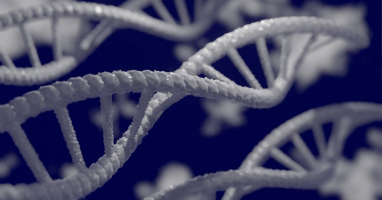
The Octopus’s Brain is Also in its Arms
Then furthermore let’s take a closer look at the mystery of the Cephalopoda’s brain.
First, let’s talk about the “encephalization quotient” of octopuses that I didn’t touch on earlier. This is an indicator of how big the brain is compared to the size of the body. Let’s review:
Human: 7.4
Dolphin: 5.3
Crow: 1.25
So what about octopuses? It turns out that the encephalization quotient of octopuses is 0.026. Isn’t that too small?

There’s a reason for this. Because the “brain of Vertebrata” and the “brain of Cephalopoda” are not directly comparable. They evolved completely differently, so it’s natural that they’re different. When we compare only the size of the organ we call the “brain”, the “brain of an octopus” appears to be abnormally small.
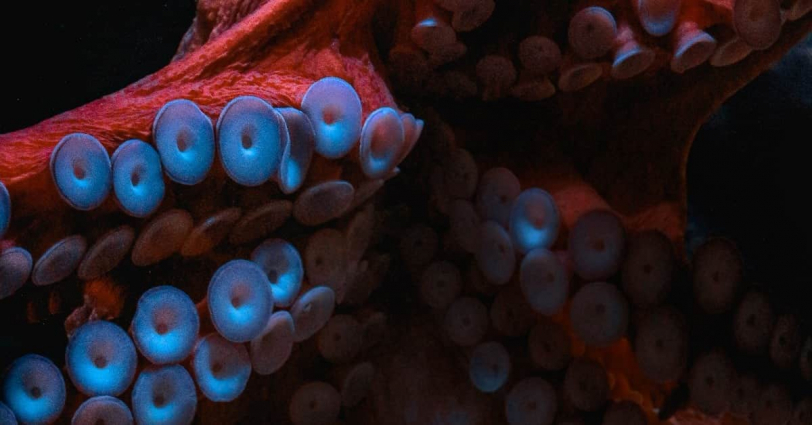
But earlier, I wrote that the “sophistication of the brain is determined by the number of neurons”. And amazingly, the octopus has also neurons in its arms. So in the case of octopuses, we can say that even their arms are brains. And if we include the neurons in their arms, it means that “octopuses have advanced brains”.
What’s even more interesting is that only a small part of the entire nervous system of Cephalopoda is located in the brain. In the nervous system of Cephalopoda, important parts are dispersed throughout their body. For example, in the case of an octopus, many neurons are concentrated in their arms. The number of neurons in their arms is almost twice the number of them in their brain when combined.
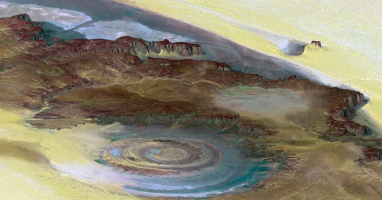
By the way, let me tell you another shocking fact about the structure of a octopus brain. It’s that “the esophagus penetrates the brain”.
What’s interesting to us is that in Cephalopoda, the esophagus, which is the tube that carries food from the mouth to the body, pierces the center of the brain. This seems too strange for us.
For example, when we eat grilled fish, we may experience the pain of bones getting stuck in our throats. In our case, it’s just a matter of saying “Ouch, that hurt”, but in the case of octopuses, whose esophagus pierces their brain, if they swallow something pointed and it gets stuck in their throat (esophagus), it could potentially damage their brain. It’s a strange story. I wonder why it was designed that way, I’d like to ask the one who designed it.

As you can see, the brain of an octopus is completely different from that of a human. This physical difference naturally leads to functional differences as well.
The octopus brain is said to be like “one player in a jazz band.” What does that mean?

When we hear the word “brain,” we might think of it as a “control tower” for the whole body. However, in the case of an octopus, it also has neurons in its arms. So, let’s say the octopus tries to move its arm. In this case, the so-called “brain” can give commands, but at the same time, since the arm itself is also a “brain,” arm can also give commands to arm itself.

This is like jazz players who play together without a conductor, adjusting to each other’s “session” in each moment. Even if the so-called “brain” gives a command, the arm can move with its own separate intention. This is expressed in this book as follows.

However, if you were to become an octopus, this boundary would become ambiguous. Even if it’s your own arm, you can only control it partially as you wish, and after that, it becomes just watching what the arm does.
I see, it’s a strange feeling.
However, the author raises a question right after this passage, saying “But is this analogy really correct?” Throughout this book, the author repeatedly tries to convey that “trying to understand cephalopods through human senses is a mistake.”
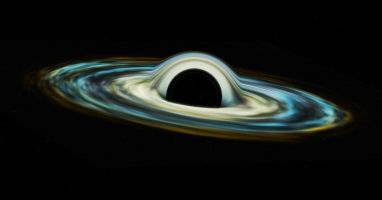
Returning to the topic, it is believed that the view that the brain is actually like a jazz player may also apply to Vertebrates. Once the brain, including that of humans, was considered to have the role of a “conductor” or “command tower,” but now some argue that such views may not bey right. However, for humans who do not have neurons in their arms, it is unclear how to imagine this.
In any case, the brain is still a mysterious entity.

A Different Kind of Octopus that Looks Like a Human
The author is a philosopher who has also studied octopuses for many years. For some reason, they discovered a place called “Octopolis” where octopuses live in close proximity (which is very rare for octopuses that don’t live in groups) and conducted fixed-point observations of octopuses there with multiple researchers.

And the author feels a strange sense of closeness to octopuses.
I think it’s amazing that octopuses have such cognitive abilities. They are so similar to us and so human-like. It surprises me.
When I’m watching Cephalopoda, I feel like they have a “heart.” Sometimes it seems like our hearts are connecting.


This book talks about various “strange behaviors of octopuses,” from those published in papers to those observed by the author. Some of these include showing interest in things that are not food, recognizing individual humans, and even enjoying playing pranks, which reveals a different side of octopuses from the common image of them being low in intelligence.
However, the author still understands that “octopuses are different from humans.” As mentioned earlier, the author repeatedly emphasizes not to try to understand octopuses through human senses and even describes the experience as “the closest encounter with an extraterrestrial biological entity.”
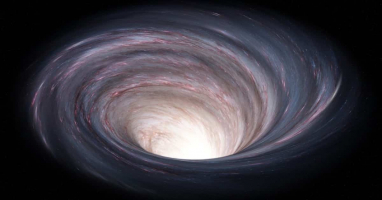
The translator’s comment in the afterword about the title of this book was also interesting. What’s notable here is that “minds” is in the plural form. The translator writes the following about this point:
However, in this book, even if non-human mammals such as monkeys or dogs had minds, the author would not be called “other minds”. Their minds are rather similar to ours. The criteria for distinction is “evolution”.
In other words, using the plural form of “minds” shows that the “mind” of Vertebrata and Cephalopoda are completely different. It’s hard for Japanese people to understand this sense, but just by using the plural “s”, we can understand the author’s idea.

Why do Organisms Age?
Finally, I would like to touch on a very interesting topic that is not directly related to Cephalopoda but caught my attention.

It is about “why organisms age.” The hypotheses written in this book were new to me and very fascinating.

It would be too long to write in detail, so let me give you a brief explanation.
Living organisms have experienced various mutations so far, and there are many different types of mutations that occur in their genes. Among them, there may be mutations that only affect organisms that live for a long time. Let’s call this a “long life mutation.”

Not all individuals have this “long life mutation”. Also, individuals with this mutation do not activate it when they are young. And although I won’t go into detail here, considering various factors, it can be explained that even if not all individuals have this “long life mutation” from the beginning, as a result, “most long lived individuals have ‘long life mutation'”(The logic around this was a bit difficult for me).
What if this “long life mutation” is the cause of “aging”? This would mean that most long-lived individuals experience aging.

In other words, “aging” is like a pre-set time bomb that is triggered by “longevity” and causes it to occur. I didn’t understand all the logic in between, but I felt this idea is very convincing.
I don’t know if this is the mainstream idea in the world of biology, but it is said that this idea was revolutionary as a concept because it seemed to be explained by a mathematical formula.

I don’t desire “immortality” or anything like that, but if we could understand the reasoning behind this, it might be possible to achieve immortality.
Conclusion
The book completely changed my image of Cephalopods like octopuses and squids by revealing their intelligence. I would like to know more about the octopus, which is an “extraterrestrial biological entity living on Earth” that evolved its “brain” in a very different way than Vertebrata.
Will we ever be able to comprehend the “sensations of moving their arms” that octopuses with a brain in its arm feel?

Published Kindle books(Free on Kindle Unlimited)
“The genius Einstein: An easy-to-understand book about interesting science advances that is not too simple based on his life and discoveries: Theory of Relativity, Cosmology and Quantum Theory”
“Why is “lack of imagination” called “communication skills”?: Japanese-specific”negative” communication”







コメント